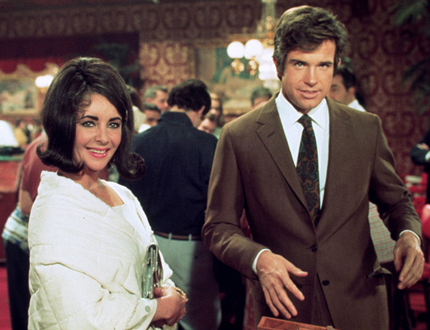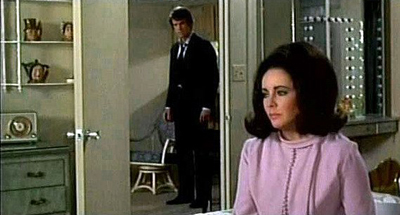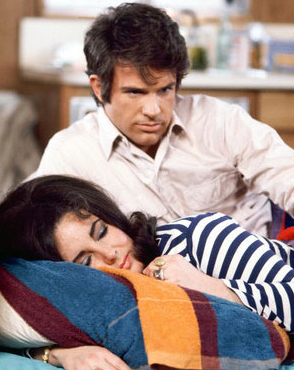
 |
|
|
|
George Stevens is an undeniably great filmmaker, and almost all of his movies made before the middle 1950s are highly entertaining. Olive Films released his utterly forgotten 1952 drama Something to Live For last year and it turned out to be quite a worthy discovery. As is often pointed out, after WW2 the director's pictures became far more serious. For the most part he abandoned comedy, preferring to make grandiose book adaptations. After 1953's Shane Stevens' pictures began to swell in size as he pursued epic subjects like tradition vs. Civil Rights (Giant) and the tragedy of war (The Diary of Anne Frank). When the Kennedys came into power Stevens expanded into politics, and shortly thereafter decided that it was his task to 'adapt' the Bible. This led to one of the most expensive, misjudged epics of all time, The Greatest Story Ever Told. Visually overwhelming but emotionally inert, Stevens' passion play is a solemn joke. Raising serious questions of taste, a parade of hammy movie stars take turns playing dress-up as Biblical figures. 
Greatest Story was an enormously costly fiscal disaster, so one would think that Stevens might go frugal when he took another swing at directing three years later. The Only Game in Town was defeated before it began, sunk by an outrageously unrealistic budget. Stevens had to have big stars, and Elizabeth Taylor insisted that the Las Vegas story be filmed in Paris, so she could be hear her husband Richard Burton. Although the film takes place mostly in one small apartment, it came in at $11 million dollars. In the same year, Bob Rafelson's Five Easy Pieces cost about a tenth as much and put ten times more production value on screen. It ranges all over the American West and into Canada. On the plus side, Frank D. Gilroy's adaptation of his own play is a fairly well written intimate relationship story. Warren Beatty is a perfect choice to play a lounge pianist with a gambling problem. Problem-child actress Liz Taylor is grossly miscast, but also contributes an appealing performance. Aging Las Vegas showgirl Fran Walker (Taylor) hasn't heard from her wealthy, married lover for six months. Feeling depressed on the walk home from work, she stops for pizza at a lounge bar and meets pianist Joe Grady (Beatty). A casual pickup turns into a testy relationship, yet they find that they're drawn to each other. Joe has saved up a pile of money for his planned relocation to New York, but he blows it in a burst of gambling fever. He moves in with Fran, under certain rules. Vegas is a hard town and showgirls have few illusions. She has no intention of linking up with another loser like herself. When they return from a weekend on a houseboat on Lake Mead, Fran's absent lover Lockwood (Charles Braswell) is waiting. Lockwood says that his divorce is on the way and hurries Fran so they can take off together. She's initially overjoyed, but begins to have doubts while packing... Frank D. Gilroy's 1965 play The Subject Was Roses won awards, made his reputation and became an excellent movie; I'm going to guess that it provided the inspiration for George Stevens to jump back into directing. It sounds like a good idea, as The Only Game in Town is an unstructured two-person piece and Stevens frequently proved his ability to fashion memorable scenes of personal interaction. Most of his 1930s and '40s comedy-dramas have lengthy dialogue passages, sometimes in a single take, that glow with life and the illusion of spontaneity. Game is about two fairly depressed people enlivened by each other's company, and some sequences indeed have the Stevens spark. But it's not nearly enough. Taylor and Beatty play reasonably well against each other, but each is doing his/her own thing. The chemistry isn't there. Stevens is wise to rush through the showgirl section. Taylor is seen prancing and smiling on stage only in a single disconnected angle, above the waist. The other girls seem chosen to look hard and unpleasant, and it's all over in about forty seconds. Not for a minute do we believe that Liz could pass for a Vegas showgirl -- 1967's Who's Afraid of Virginia Woolf? showed that her once-slim figure was a thing of the past. With a couple of exceptions Taylor had spent the 1960s in one expensive flop after another. This would perhaps be the last time that a studio would throw away millions on the illusion that she was a box office draw. 
Fran's bitterness over her messed-up love life surfaces frequently, when she overreacts to Joe's coy quips and too-blunt questions. Some of their interplay is quietly believable, and the passages of clever banter are reasonably well judged. There's enough conflict to keep the show going for about an hour, when it instead lasts for two. At the seventy-minute mark Fran's relationship with Lockwood is resolved without ever really being developed. That leaves us with forty minutes of repetitive issues for Fran and Joe to mull over. In all fairness the last ten minutes are fairly satisfying. But the story must cheat to get there. Fran was keeping charge of Joe's cash for him, but he falls prey to his usual vice and runs amuck in a casino. Somehow it seems wrong for the day to be (partially) saved in this way. The Only Game in Town seemed to be pointing in a different direction. Our lesson, children? Gambling is a way out of one's problems. The final message is a bland endorsement of marriage. It 1 It doesn't help that The Only Game in Town is PG-rated. Vegas was never a PG place and the folk that find themselves adrift there don't normally lead PG lives. Nobody in this movie as much as says a naughty word. Stevens is willing to let Fran and Joe co-habit, but old-fashioned film fades intrude whenever they as much as kiss. Liz is too plump to permit Fran to dress provocatively. Joe is pretty charming but his gambling mania is just something that shows up to provide another setback. Besides the dice table, neither has any vices or any unsavory associates. No associates at all, actually. Joe is pretty cute mumbling to himself and pulling little stunts in the hallway, like singing "Some Enchanted Evening" to embarrass Fran. The production particulars make one want to tear one's eyes out. An $11 million price tag to produce this movie in 1969 was outrageous. Released the same year, the enormous epic Patton reportedly cost $12 million. Ten full years later Columbia Studios was having apoplexy when 1941's cost climbed to $11 million, and that movie took two years to make and is packed with incredible production values. Game looks too cheap to be a made-for-TV movie. Most of it takes place in one ordinary apartment interior and hallway. For a few shots showing the view out of Fran's window, a fairly large forced perspective set was built, to depict some buildings on the Vegas strip. Add one lounge bar interior and some street sets. The trip to Lake Mead is covered in a couple of composite shots of Beatty fishing; Liz stays inside the houseboat, another tiny set in Paris. Finally there's the issue of the American supermarket. It's suggested that the market was a full set built in Paris as well, but at that time some similar markets existed; we see examples in a Jean-Luc Godard movie, and in the parody Mr. Freedom. We're also told that a Game crew did film for a few days in Vegas, at the end of the schedule. The supermarket scene is so brief. Was it perhaps obtained at that time? 
The Only Game in Town must take its place beside other miscalcuated, commercially hopeless "old man's movies" made in the late '60s by classic-era directors. It's certainly a prime example of the old-school thinking that brought the town to a grinding halt: Hello, Dolly!, Darling Lili, On A Clear Day You Can See Forever. Too much money, a foolish reliance on the illusion of star power, and a pitch to an audience that just wasn't there any more... Game is likeable but irrelevant. George Stevens tries, but his movie died a quick death upon release. The Twilight Time Blu-ray of The Only Game in Town is a fine HD transfer of this now-obscure curiosity, which should more than satisfy fans of Liz on the wane and Warren Beatty ascending. The handsome cinematography speaks well for cameraman Henri Decae, known for his color work on great French pictures like Purple Noon, ¡Viva María!, and Le Samouraï. Long before, George Stevens had become known for slow, artistic dissolves. He worked with the best Hollywood labs to produce long-duration opticals with little or no drop in visual quality. The one he attempts here is technically rough by comparison... could it have been a job by a French lab? Maurice Jarre's jazzy music score is given its own chance to shine on an Isolated Music and Effects track. The music is a big bonus, helping to generate some atmosphere for a "Vegas" represented mainly by a procession of generic shots of hotels and neon marquees. Then again, maybe Stevens had something there -- in 1969 that's about all there was to the town, really. An original trailer mentions "THE HIT BROADWAY PLAY" even though the liner notes by Julie Kirgo tell us that the stage version closed after only eight performances. Kirgo's essay sketches out George Stevens' impressive career before addressing the odd circumstances of this picture and the 'big star' personality issues that affected the shoot. I would never have known that Taylor wore a variety of wigs through the film, as that kind of 'big hair' look has seemed part of her ever since BUtterfield 8. The Only Game in Town is certainly worth a look. It's not my idea of a really bad Liz Taylor movie by a golden-era director -- that would have to be Vincente Minnelli's risible The Sandpiper.
On a scale of Excellent, Good, Fair, and Poor,
The Only Game in Town Blu-ray rates:
Footnote:
1. Gilroy's later work as a writer-director is really weird. 1971's Desperate Characters starring Shirley MacLaine is a similarly small-scale, almost terminally depressing drama about some of the most unpleasantly miserable people you'd ever want to meet. 1975's From Noon 'til Three is the opposite, a romantic fairy tale with a marvelous story hook, and should have been a big hit. It even makes good use of a beautiful theme song. Alas, Gilroy's direction is weak and his romantic couple Charles Bronson and Jill Ireland are not up to the task.
Reviews on the Savant main site have additional credits information and are often updated and annotated with reader input and graphics. Also, don't forget the 2011 Savant Wish List. T'was Ever Thus.
Review Staff | About DVD Talk | Newsletter Subscribe | Join DVD Talk Forum |
| ||||||||||||||||||